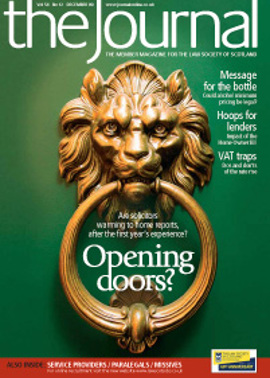Communication, communication, communication

Many complaints, disputes, claims and other problems boil down to misunderstandings, so it is little surprise to learn that poor or ineffective communication lies at the root of many claims made against solicitors. Reports indicate that the most frequent cause of service complaints is communication breakdown.
Perhaps as many as a third of all Master Policy intimations may be attributed to a breakdown in communication or a misunderstanding of some sort. Many claims involve a factual disagreement between solicitor and client. Many involve allegations of failure to inform, advise or warn.
A challenge
Are you confident that misunderstandings could not arise between you and your clients? Are you sure that neither you nor your clients are proceeding on the basis of an incorrect assumption about a key aspect of the transaction? How can you be confident?
The following series of case studies illustrates the potential for misunderstandings and incorrect assumptions. They also demonstrate the scope for addressing these communication risks by ensuring key points are effectively communicated and recorded.
Case study 1
Practice A acted for Mr Brown in a reparation claim arising out of an accident at work. Liability was in dispute, but there were different versions of how the accident had occurred from the three witnesses. Mr Brown was reluctant to give evidence, and settlement was negotiated at the doors of the court with his authority at a sum well below the amount sued for.
Mr Brown subsequently made a claim against his solicitors alleging that the settlement had been made against his will. The responsible partner maintained that Mr Brown had agreed the basis of the settlement and given authority to proceed.
If only the file had included an attendance note giving details of the discussions at court and confirming that the client had given his authority to settle. If only a confirmatory letter had been sent to Mr Brown.
Case study 2
Practice B acted for Mr and Mrs Green in a house purchase. Two years later, the Greens contacted the firm complaining that new neighbours were claiming ownership of a plot of ground across the road which the Greens had considered belonged to them.
The purchase file was retrieved from storage, but it made no mention of the additional area of ground the Greens believed to have been included in what they had purchased.
If only the file had included a letter sending out a plan and asking the Greens to confirm that the area indicated on the plan was the same as they understood they were buying.
Case study 3
Practice C acted for Mrs Elder and her daughter and son in law, the Youngers, in the purchase by the Youngers of a house in which they could all live. Mrs Elder provided the bulk of the purchase price, the balance being funded by the Youngers by way of a mortgage. Following a family fallout, Mrs Elder claimed that she had not been properly advised and should have had a contract enabling her to force a sale of the property and recover her money.
The firm intimated the claim to insurers and explained that they had been acting only in the purchase and that, prior to instructing the firm, Mrs Elder and the Youngers had already agreed the basis on which they were purchasing, funding and occupying the property. The insurers’ view?
If only the firm had written to Mrs Elder advising her of the risks involved in proceeding as planned and strongly suggesting that she would be well advised to seek separate representation and advice.
Case study 4
Practice D acted for Mrs Wright in connection with the preparation of an agreement dealing with the sharing of the parties’ matrimonial property on separation. Mrs Wright subsequently alleged that her solicitors had failed to advise her in relation to her spouse’s pensions and, in particular, that if she settled on the basis set out in the agreement she would be giving up her rights to make a claim on his pension rights. The solicitor was adamant that advice was given during a telephone call and at a meeting.
If only the file had contained file notes of the telephone call and meeting, and a follow-up letter to record the advice given.
Case study 5
Practice E had acted for Mr Bigg for several years. An extremely demanding client, he produced regular work for the firm’s commercial team. When Mr Bigg’s aunt died, the client partner promptly introduced one of his trust and executry colleagues, assuring Mr Bigg that his aunt’s estate was in good hands. The client partner was shocked when, months later, he received an email from Mr Biggs with a veritable tirade about the length of time it was taking to wind up his aunt’s estate and alluding to loss of an investment opportunity as a result of the “delay in receiving my inheritance”. The email concluded: “If it takes the firm six months to wind up a simple estate, I have to question the firm’s ability to handle my other business properly”.
No Master Policy claim arose in this case, but a significant client relationship may have been damaged – perhaps a significant client lost. If only the client had been given an indication of likely timescale and factors that might affect the timescale.
Case study 6
Practice F received a letter claiming for losses sustained by a former client “as a result of having been committed to missives to purchase prior to concluding a contractual bargain to sell her existing property”. The letter went on to allege that the former client had not been properly advised by Practice F of the contractual nature of the missives process, and had not realised that by concluding the bargain to purchase she could not escape without penalty from the contract to buy.
If only there was a record of the client being given a clear explanation before conclusion of the implications of missives being concluded – and a record of the client’s instructions to proceed.
Conclusions
What can you do to avoid the communication problems illustrated in these case studies? Keep in mind the following points when meeting with and reporting to clients, and consider these points when reviewing your files:
- Is significant advice recorded in writing (and, where appropriate, acknowledged by the client)?
One of the concerns currently being expressed in relation to the impact of the recession is that clients experiencing changed circumstances and financial pressures will be prompted to re-examine advice given by solicitors, settlements achieved and contracts documented and, with the benefit of hindsight, allege that risks should have been anticipated, that they should have been better protected, that a better deal should have been achieved for them. Responding to this sort of allegation will be assisted by having a well documented file as well as a clearly defined scope of engagement.
- Has the client been kept regularly updated in accordance with the terms of engagement? Is legal jargon avoided so far as possible?
Getting terms of engagement right is one of the ways of avoiding claims and complaints. During more challenging economic conditions, when clients may be more inclined to dispute fees, and challenge the service provided, it is particularly important to ensure that clients are absolutely clear about the scope of your engagement for the particular transaction and the terms on which services are being provided. A number of claims alleging negligence have arisen in response to proceedings raised for payment of the solicitors’ fees where there has been no evidence of prior client dissatisfaction.
Has the method of charging been agreed with the client in advance and set out clearly in terms of engagement/business? Is the client kept advised of changes in expected costs and the reasons for this?
Alistair Sim and Marsh
Alistair Sim is a former solicitor in private practice who works in the FinPro (Financial and Professional Risks) National Practice at Marsh, the world’s leading risk and insurance services firm. To contact Alistair, email: alistair.j.sim@marsh.com .
The information contained in this article provides only a general overview of subjects covered, is not intended to be taken as advice regarding any individual situation and should not be relied upon as such. Insureds should consult their insurance and legal advisers regarding specific coverage issues.
Marsh Ltd is authorised and regulated by the Financial Services Authority.
Three top risk management targets
The Society’s Insurance Committee has identified three categories of claim (based on the frequency, severity, or avoidability of claims) which it believes the profession should be specifically targeting:
Break notice defects
break notices not being served in accordance with the terms of the lease and therefore being ineffective
CML Handbook breaches
lender claims alleging breach of CML Handbook reporting requirements
Overlooked securities & inhibitions
claims for inhibitions or postponed securities which have not been identified from searches undertaken, including form 12 and form 13 reports.
The committee believes that the adoption of effective risk management measures could effectively eliminate the incidence of these claims.
Identify possible gaps in your systems and procedures, and prioritise the actions you/your firm will take to address them.
Impact of effective communication on top three targets
How could improved communication have a beneficial impact on the targeted categories of claim?
Ineffective break notices may be attributable to “process errors” where notices have been served too late or by the wrong method, but in some cases they are attributable to “communication errors or omissions”. The tenants’ solicitors may be unaware of a change of landlord, but the tenants certainly ought to know. Making sure the client fully appreciates the vital importance of naming/serving notice on the correct landlord is essentially a matter of effective communication.
CML Handbook breaches: process failure or communication failure, or both? Allegations being made by lenders at this time include that solicitors have failed to report facts in accordance with the CML Handbook. In some of these situations, it may have seemed to the solicitor unclear whether it was strictly necessary to report particular facts because (a) the lender must be assumed to be aware of the facts already, or (b) it was unclear whether the lender would consider the facts material and therefore expect the facts to be reported. As far as the Master Policy insurers are concerned, the prudent approach to be adopted is “If in doubt – communicate!”
In this issue
- Home reports have devastated the Scottish house market
- Review of the Fatal Accident Inquiry Legislation
- The Gill Review: a personal injury practitioner’s perspective
- A tale for our times
- A step too far?
- Report card
- Down the slipway
- Homing instinct
- Bottle for a contest
- Ready for the VAT rise?
- New website to promote training openings
- First solicitor advocates approved as "senior"
- Your feedback
- The very definition of paralegal
- Law reform update
- Lawyers can network too
- Ask Ash
- Welcome, user! (and you're sued)
- Communication, communication, communication
- Keeping the peace
- On the mark?
- Crown disclosure: the next level
- Tackling improvements
- Camera angles
- Cutting red tape in Europe
- Scottish Solicitors' Discipline Tribunal
- Website review
- Book reviews
- Calling the shots
- Sector "rising to challenge": Millar
- "One size" is a dodgy fit
- BSA brings in standard instructions
- A new burden is born






